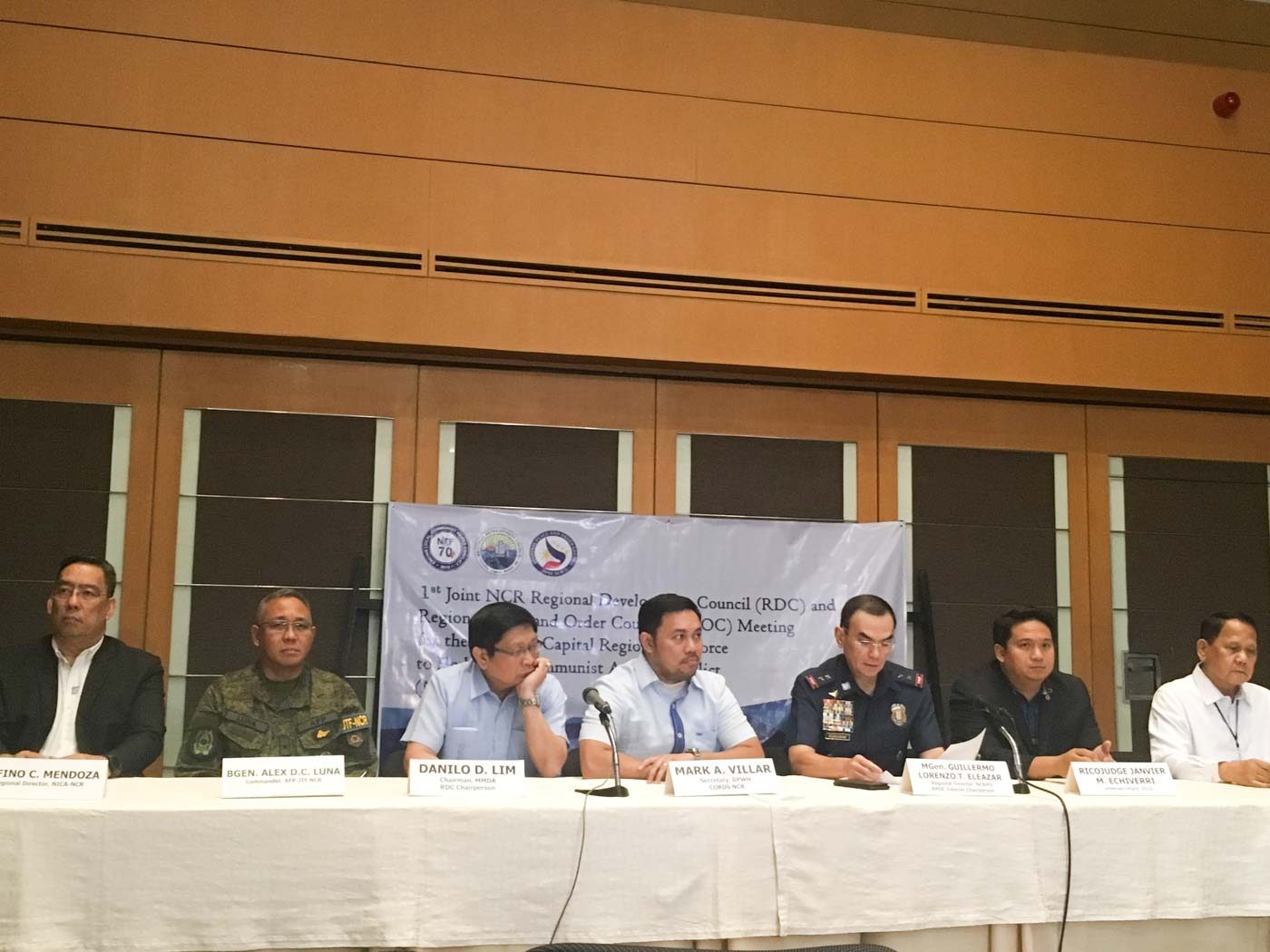SUMMARY
This is AI generated summarization, which may have errors. For context, always refer to the full article.

MANILA, Philippines – How will a task force end armed conflict while situated in a region without it?
A group dubbed as the National Capital Region (NCR) Task Force to End Local Communist Armed Conflict said it was focusing primarily in the metro to counter “front organizations” that function as legal entities but are allegedly linked with the Communist Party of the Philippines-National People’s Army (CPP-NPA).
NCR Police Office chief Major General Guillermo Eleazar, a member of the task force, said though there was no armed conflict in Metro Manila, the megapolis was a hotbed for recruitment and for generating funds.
“Ang dito ngayon, ‘yung sinasabi nating sentro ng mga front organization nila. So we will focus our effort on countering that, at ipakita sa ating mga kababayan ‘yung reality and how we can convince the public na communism is not the solution para sa improvement, development ng ating bansa,” Eleazar said.
(NCR is the center of the armed group’s front organizations. So we will focus our effort on countering that, showing the people the reality and convincing them that communism is not the solution for the improvement and development of our country.)
The task force was created on Tuesday, September 10, by the NCR Regional Development Council, which is under the National Economic and Development Authority, and the Regional Peace and Order Council of the National Security Council.
Legal leftist groups such as those of the Makabayan bloc in the House of Representatives have been accused of being front organizations of the CPP-NPA. Defense Secretary Delfin Lorenzana even dared them to condemn the insurgency.
Representatives of party-list groups Bayan Muna, Kabataan and ACT Teachers said there was no evidence to back these accusations.
Recently, leftist groups were also accused of kidnapping and recruiting minors to join militant groups, prompting Senator Ronald “Bato” Dela Rosa to propose increased police patrols in schools.
Eleazar said that though universities and colleges will be part of the task force’s action plan, he clarified that uniformed policemen will not be patrolling inside schools. Rather, he said, they would have dialogues with students.
The AFP had also said that soldiers would engage students in information campaigns.
Eleazar said these proposed dialogues would be on a voluntary basis, with assistance from school administrations and organizations.
He also believed there would be no conflict in schools between groups that support and oppose the government, because they “know what is right and wrong.”
Department of the Interior and Local Government Undersecretary Ricojudge Echiverri said they would go to schools and engage in “healthy discourse,” and that he has already tapped the National Youth Commission to have a debate with the University of the Philippines and other universities.
“Hindi ho masama ang prinsipyo, ang masama ‘yung armed conflict. Kasi ang problema, hanggang ngayon hindi naman kino-condemn ng mga makakaliwang grupo ‘yung NPA as it is. Did you hear it from their words, from their mouth, that they’re condemning the acts of the NPA? Or they are dissociating themselves from it? Hindi eh. They remain as it is and unti-unti, ‘pag nakakabuo na sila, nirerecruit sa armed group,” Echiverri said.
(The principle itself is not bad, what’s bad is armed conflict. The problem is, leftist groups haven’t condemned or dissociated themselves from the NPA as it is. They remain as it is, and little by little, members are recruited into the armed group.)
Earlier, DILG Secretary Eduardo Año has proposed to outlaw communism and make membership in groups with communist ideologies illegal.
Target areas
The task force will be addressing areas “prone to communism” particularly urban poor and labor sectors, citing the CAMANAVA (Caloocan, Malabon, Navotas, and Valenzuela cities) area as an example.
“Walang armed component pero ito ‘yung nacoconvince nila to join rallies and maging basis ng mga front activities na sumusuporta dun sa armed component nila,” Eleazar said.
Echiverri cited how Valenzuela City Mayor Rex Gatchalian had already talked to labor groups in his jurisdiction and created an ordinance to fast-track mediation of labor conflicts.
“If you let unrest happen, at walang mediation, walang dialogue, mas maraming dispute… Without dispute hindi magta-thrive ‘yung communism (If you let unrest happen without mediation and dialogue, there will be more dispute. Without dispute, communism will not thrive),” Echiverri said.
Echiverri added that the agency would also be monitoring if local government units are able to provide the basic services. “Ang DILG is not here to pinpoint na may kasalanan ka (The DILG is not here to point out mistakes). We will help the local government in giving best practices and helping them craft a policy if they need our help, and help them in all ways to address the urban poor,” he said. – Rappler.com
Add a comment
How does this make you feel?
There are no comments yet. Add your comment to start the conversation.